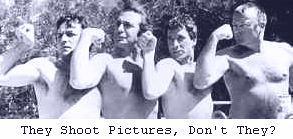The next film on our list comes to us straight from 1957 Poland. Kanał (thanks to Smileyman, I now have an "ł") just manages a place on the list at #989. This film details the Warsaw Uprising (not to be confused with the Warsaw Ghetto Uprising), a major operation that the Polish resistance Home Army launched to liberate Warsaw from the Nazis, only to be brutally suppressed. I anticipate this film to be uplifting, and in no way depressing enough to make me want to throw myself out of a window.
We meet the forty three remaining resistance fighters on the fifty sixth day of the Warsaw Uprising. Finding themselves surrounded by the Germans, their numbers and resources thoroughly depleted, they have only one option left: a desperate, claustrophobic, dehumanizing journey through the Warsaw sewers. Despite their best efforts, they're doomed to be picked off one by one. Every character's story is engaging, and their battle to survive is told honestly and without pretense. I especially like the Jacek and Daisy (as they're called in the English subtitles), a pair of lovers in the resistance who struggle tooth and nail to escape the sewers and eventually reach an opening -- only to discover that it has a strong iron gate preventing their escape.
I think it's interesting that they chose to start the film almost at the end of the Warsaw Uprising, when the troops are battle weary and nearly beaten. In a lot of ways, it makes sense from a dramatic point of view. This film is made for an audience already very familiar with the uprising, and everyone knows why the uprising began. The drama's not in their getting angry enough to take arms against a sea of troubles, it's in the hopelessness and desperation of being completely massacred for fighting back. So I kind of like that they cut through the introduction and rising conflict and immediately skip to a group of resistance fighters on the verge of their tragic ending. It's a good move.
I like the sense that everything they're doing is just to serve as a symbol of resistance. As someone somewhere once said, "The Nazis will kill you for nothing, so you might as well die for something." They know that they have no chance of actually defeating the Nazis, they know that they're all going to die and soon, but they also know that they're going to die like heroes, and that people will look back on them as those who took a stand. So it's poignant in a way that one of the leaders is so insistent upon keeping proper records. They know full well that it won't make a difference for them at all, but they want something of their rebellion to be saved so that it won't be forgotten.
And oh my God, when the soldier's flirting with that young woman and casually asks her how bad her wound is, she's like Eh not bad - and then they lift her stretcher, revealing that her right leg has been amputated above the knee!!
Kanał is an intense, unflinching look at the Warsaw Uprising, an often overlooked event in history. It's clear that the film was very close to the hearts of everyone who worked on it, and it's an incredibly powerful, emotional tribute to the resistance fighters of this movement. This is an important story that needed to be told, and the fact that this film was even made so close to Stalin's death is pretty miraculous, given the Communist government's general feelings on resistance movements. I picked this movie off the list because I love history and thought it would be an interesting film to watch...was not expecting to have my heart ripped out and stomped on. Job well done, then, Andrzej Wajda. Job well done.
Come back next time, when I will be watching something involving rainbows and puppy dogs. Thanks for reading!














0 comments:
Post a Comment